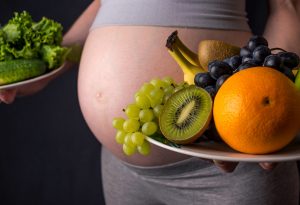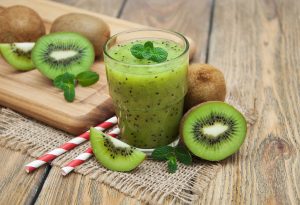In this Article
Pregnancy is accompanied by a strong urge to eat. This is only natural, as the mother needs to eat for herself as well as for the baby. Certain foods are good for the development of the foetus. While moms-to-be may have different cravings, especially sugar cravings, they are always recommended to choose a piece of fruit over chocolate or other sugary food.
Can pregnant women eat kiwi? If you are tempted by the lush and juicy kiwi, read on to learn if you can indulge in this delicious fruit.
Is It Safe to Eat Kiwi During Pregnancy?
Kiwi or Chinese gooseberry is a fleshy, green fruit that is packed with plenty of health benefits for pregnant women aside from the fact that it is delicious!
Rich in vitamin C and low in sugar and fat, kiwi is ideal for consumption during pregnancy. Also, it contains no cholesterol. The only reason you may need to avoid it is if you are susceptible to gastritis or heritable allergy. Eating 2 -3 kiwi fruits each day is perfectly safe.
Nutrients in Kiwi Fruit
This superfruit is packed with vital nutrients: vitamin K, vitamin C, vitamin E, potassium, folate, dietary fibre, copper, choline, magnesium, and phosphorus. It provides over 140% of the daily recommended dose of vitamin C.

Nutrients Present in 1 Medium-Sized Kiwi Fruit
| Calories | 42 |
| Protein | 0.8 grams |
| Total Fat | 0.4 grams |
| Fibre | 2.1 grams |
| Vitamin A | 3 micrograms |
| Iron | 0.2 milligrams |
| Potassium | 252 milligrams |
| Folate | 17 micrograms |
| Vitamin C | 64 milligrams |
Health Benefits of Eating Kiwi Fruit for Pregnant Women
Listed below are some of the health benefits of kiwi:
1. Folate: Folic acid plays an integral role in the cognitive development of the foetus. It helps develop the brain as well as the nervous system and prevents neural defects in the unborn baby. It is a critical nutrient for the formation and maintenance of cells. It is also responsible for the development of the baby’s vital organs. Folate prevents congenital disabilities in babies such as spina bifida, a medical condition in which spinal cord is not fully developed. Having kiwi during the early pregnancy phase will also reduce the chances of having a miscarriage.
2. Vitamin C: Vitamin C is vital for the formation of neurotransmitters, which are crucial to brain function. Foods that are rich in antioxidants protect the mother-to-be from the harmful effects of free radicals. It is excellent for boosting energy levels and strengthening the immune system.
3. Natural Sugars: Kiwi, like all fruits, contains natural sugars to help control your sweet cravings. Low in glycemic index, it does not lead to a major spike in the levels of insulin. It is essential in regulating blood sugar levels as gestational diabetes during pregnancy is quite common.
4. Promotes Digestion: Constipation is normal during pregnancy. You will need to include probiotics in your diet to help prevent diarrhoea, bloating, nausea, stomach discomfort, abdominal pains, and gastritis. Kiwi is rich in dietary fibre, which keeps the colon healthy. Fibre-rich foods are natural laxatives that aid digestion.
5. Iron: Pregnant women are often afflicted with an iron deficiency, anaemia, caused by the lack of haemoglobin in the blood. Other symptoms of low iron include pale skin, poor appetite, and nausea. Iron is needed for the production of red blood cells. It also carries oxygen between cells and is essential for energy production. Kiwi provides 4% of iron per serving. It also facilitates absorption of iron, thus preventing anaemia.
6. Calcium: Calcium is essential for the development of the baby’s bones, muscles, teeth, and heart. Kiwi fruit contains 5.5% calcium; if your dairy consumption is low or if you are lactose intolerant, it would be advisable to include calcium-rich kiwi in your diet. It also contains magnesium, which improves the absorption of calcium.
7. Rich Source of Vitamins and Minerals: Besides being rich in vitamin C, kiwi has large amounts of vitamin E which protects you and your baby’s cells from damage. It promotes healthy skin.
8. Strengthens Immune System: The copper present in kiwi assists in the brain development of the child and also strengthens the immune system.
9. Hormonal Balance: Hormones can create havoc during pregnancy as you may suffer from depression, feel tired or feel stressed. A serving of kiwi can help balance hormones which can prevent any mood swings from taking place.
10. Low Calories: Kiwi is a low calorie, naturally sweet option to satiate cravings and hunger without piling on the pounds.
How to Eat Kiwi Fruit

Kiwi can be consumed in many ways, such as:
- Cut the fruit, scoop the fruit off of the skin and enjoy
- Include it in your salads with other fruits.
- Add it to smoothies or yoghurt.
- Freeze the slices or pulp of and turn them into popsicles.
Risks Associated with Consuming Kiwi Fruit During Pregnancy
Being allergic to kiwi is uncommon. However, one might develop an allergic reaction to it or may consume it to the point where the effects are negative. It is advisable to consult your doctor before adding kiwi to your regular diet plan. Side effects of kiwi fruit for pregnant women are:
- Oral Allergies: Overconsumption of kiwi can cause itching or a tingling sensation in the mouth, leading to swelling of the lips and tongue. In some cases, it can trigger asthma, rashes and hives.
- Skin Ailments: Overeating kiwi may cause acute urticaria, chronic urticaria, dermatitis, or even contact dermatitis. The risk is higher if you are allergic.
- Digestive Problems: In certain cases, overeating kiwi can cause diarrhoea, vomiting or nausea.
- Latex Allergy: People allergic to latex are prone to kiwi allergies. It is advisable to keep away from kiwi in such cases.
- Damage to the Pancreas: Kiwi is a rich source of vitamin c, vitamin E, serotonin and potassium. When taken in large amounts, it can alter triglyceride levels in the blood and in the long run, be harmful to the pancreas.
- Side-Effects: Kiwi fruit has anti-fungal properties and can lead to an additive effect when combined with anti-fungal medicines. If you are taking anticoagulants, heparin, aspirin, non-steroidal, anti-inflammatory or anti-platelet drugs, consult your doctor before consumption of kiwi fruit.
How Much Kiwi Should You Consume During Pregnancy?
Ideally, a mom-to-be should have 1 cup of chopped fruits a day, or 1 piece of fruit for large fruit. For a healthy and safe pregnancy, you can consume about 2-3 kiwi fruits per day. In case you are suffering from gastritis, allergies or any digestive issues, consult your doctor before adding kiwi to your regular diet. If you are prone to acidity or rashes and allergies, kiwi can trigger acidic reactions and can cause soreness in the mouth or tongue.
Watching your diet is essential during pregnancy since your body becomes vulnerable during this time. Kiwis can help provide certain nutrients for the body that would help the foetus to grow. However, they should be eaten in moderation as too much of anything is bad.
Resources and References: Medical News Today









